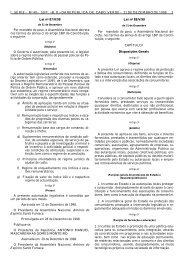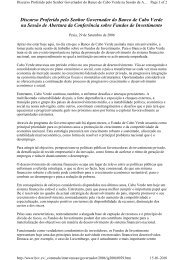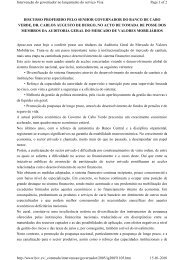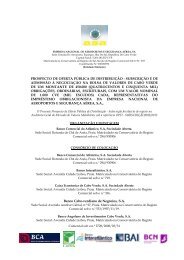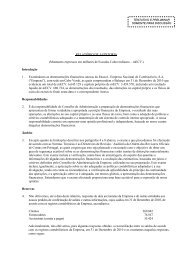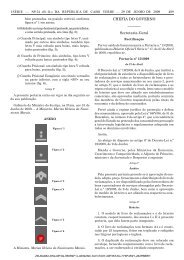Relatorio_final_BAI_10. - Cabo Verde
Relatorio_final_BAI_10. - Cabo Verde
Relatorio_final_BAI_10. - Cabo Verde
Create successful ePaper yourself
Turn your PDF publications into a flip-book with our unique Google optimized e-Paper software.
.40<br />
<strong>BAI</strong> - Relatório & Contas | 10 - 5. Enquadramento Macroeconómico Financeiro<br />
<strong>BAI</strong> - Annual Report | 10 - 5. Financial Macroeconomic Framework<br />
importações muito superior ao das exportações. Os dados recentemente<br />
divulgados dão sinais algo contraditórios. Embora<br />
a despesa de consumo esteja a aumentar, o crescimento da<br />
produção industrial permaneceu fraco nos últimos meses. Em<br />
termos gerais, essa evolução aponta para uma expansão sustentada,<br />
embora modesta, do PIB real no quarto trimestre de<br />
20<strong>10.</strong> Em termos prospectivos, os indicadores baseados em<br />
resultados de inquéritos sugerem uma melhoria gradual da<br />
actividade económica, mas globalmente a recuperação deverá<br />
permanecer moderada a médio prazo.<br />
Os níveis baixos da confiança dos consumidores e a necessidade<br />
de novas correcções no balanço das famílias podem limitar<br />
a recuperação no futuro próximo e o mercado de trabalho<br />
deverá melhorar apenas gradualmente. Entretanto, a recuperação<br />
do mercado da habitação está a ser retardada pelo excesso<br />
de oferta e pela fraca procura.<br />
No que respeita à evolução dos preços, a inflação homóloga medida<br />
pelo IPC permaneceu num nível baixo ao longo dos últimos<br />
meses, enquanto a inflação subjacente voltou a desacelerar. A<br />
inflação homóloga global subiu para 1.2% em Outubro de 2010,<br />
face a 1.1% em Setembro. À semelhança dos últimos meses, o<br />
principal determinante desta subida foi o aumento dos preços<br />
dos produtos energéticos.<br />
Os preços do petróleo aumentaram de forma constante ao longo<br />
dos últimos três meses. O preço do petróleo bruto Brent<br />
situou-se em USD 86.6 por barril em 1 de Dezembro, ou seja,<br />
cerca de 11% acima do valor registado no início do ano. Numa<br />
perspectiva futura, os participantes no mercado ainda esperam<br />
preços do petróleo mais elevados a médio prazo, com os contratos<br />
de futuros para Dezembro de 2012 a serem transaccionados<br />
a USD 92 por barril.<br />
O aumento dos preços do petróleo ocorreu no contexto de uma<br />
maior restritividade do equilíbrio entre a oferta e a procura. Esta<br />
recupera gradualmente nas economias dos países pertencentes<br />
e não pertencentes à OCDE, e a Agência Internacional de Energia<br />
reviu repetidamente em alta as previsões para a procura de<br />
petróleo em 2010 e 2011, principalmente com base no pressuposto<br />
de que o crescimento económico mundial vai melhorar.<br />
A evidência mais recente com base em resultados de inquéritos<br />
confirma que a recuperação da economia mundial progrediu<br />
mais lentamente na segunda metade de 20<strong>10.</strong><br />
exports, deriving from a much higher growth in imports than exports. Recently<br />
published data give off conflicting signals. Although consumption expenditure is<br />
increasing, growth of industrial output over the last few months has remained<br />
weak. In general terms, this evolution points towards a sustained, albeit moderate,<br />
expansion of real GDP in fourth quarter 20<strong>10.</strong> In prospective terms, survey-based<br />
indicators suggest a gradual improvement of economic activity, although global<br />
recovery is likely to remain modest over the medium term.<br />
Low levels of consumer confidence and need for further adjustments to households’<br />
balance sheets may limit recovery in the near future and the labour market<br />
is expected to show only gradual improvement. Housing market recovery is also<br />
being retarded by oversupply and weak demand.<br />
As regards price evolution, year-on-year inflation measured by the CPI has remained<br />
low over the last few months, with underlying inflation once more decelerating.<br />
Global year-on-year inflation increased to 1.2% in October 2010, in<br />
comparison to 1.1% in September. As in the case of the last few months, the main<br />
determinant for this increase was the hike in energy commodity prices.<br />
There has been a constant increase in oil prices over the course of the last three<br />
months. The price of Brent on 1 December was USD 86.6 per barrel, i.e. up around<br />
11% in comparison to the start of the year. From a future perspective, market<br />
players are expecting even higher prices over the medium term, with December<br />
2012 futures contracts being traded at USD 92 per barrel.<br />
The hike in oil prices occurred in a context of greater restrictiveness in the balance<br />
between supply and demand. The latter is gradually on the increase in the economies<br />
of OECD member and non-member countries with the International Energy<br />
Agency having repeatedly revised its forecasts on the demand for oil upwards in<br />
2010 and 2011, mainly based on the premise of an improvement in world economic<br />
growth.<br />
The most recent survey-based evidence confirms that world economic recovery<br />
was slower in second half 20<strong>10.</strong><br />
5.2.<br />
Contexto <strong>Cabo</strong>-verdiano<br />
Context of <strong>Cabo</strong> <strong>Verde</strong><br />
A<br />
evolução dos indicadores da procura, produzidos pelo<br />
Banco de <strong>Cabo</strong> <strong>Verde</strong>, indiciam um reforço da tendência<br />
de recuperação da actividade económica em 20<strong>10.</strong><br />
Nos últimos três meses, o indicador de consumo, nomeadamente<br />
as importações de bens de consumo, cresceu 29,8% em<br />
termos homólogos (28,2 no trimestre terminado em Novembro).<br />
Para a evolução do indicador concorreram o aumento expressivo<br />
registado nas importações de bens de consumo duradouro<br />
(15,6%, embora desacelerando dos 37,8%), e a aceleração das<br />
importações de bens de consumo não duradouros (de 26,7%<br />
para 32,6%). Em termos médios, em 2010, o indicador de consumo<br />
cresceu 6,7% (-0,1% em 2009).<br />
Os indicadores de investimento, nomeadamente as importações<br />
de bens de construção e bens de equipamento aceleraram para<br />
27,8% e 64,1% respectivamente no trimestre, impulsionando a<br />
recuperação da formação bruta de capital fixo (FBCF). Não obstante,<br />
as importações de materiais de transporte registaram<br />
uma queda de 3,7% no período (+12,1% no trimestre terminado<br />
em Novembro). Em termos médios, em 2010 o indicador global<br />
de FBCF registou um aumento de 3,6%, que compara à redução<br />
de 0,5% observado em 2009.<br />
<strong>BAI</strong> - Relatório & Contas | 10 - 5. Enquadramento Macroeconómico Financeiro<br />
<strong>BAI</strong> - Annual Report | 10 - 5. Financial Macroeconomic Framework<br />
E<br />
volution of demand indicators, produced by the Bank of Cape <strong>Verde</strong>, point<br />
to a reinforcement of the trend towards economic recovery in 20<strong>10.</strong> The<br />
consumption indicator over the last three months, notably imports of consumer<br />
goods, was up 29.8% year-on-year (28.2% for the quarter ended November).<br />
Components in the evolution of the indicator included the expressive increase<br />
in imports of consumer durables (up 15.6%, albeit decelerating from 37.8%) and<br />
acceleration of imports of non-durable goods (from 26.7% to 32.6%). The consumer<br />
indicator was up by an average of 6.7% in 2010 (down 0.1% in 2009).<br />
Investment indicators i.e. imports of construction goods and equipment accelerated<br />
27.8% and 64.1% respectively in the quarter, fuelling recovery of gross fixed<br />
capital formation (GFCF). Imports of transport material were, however, down<br />
3.7% in the period (up 12.1% in the quarter ended November). In average terms the<br />
global GFCF indicator was up 3.6%, in 2010, in comparison to the 0.5% reduction<br />
noted in 2009.<br />
41.



